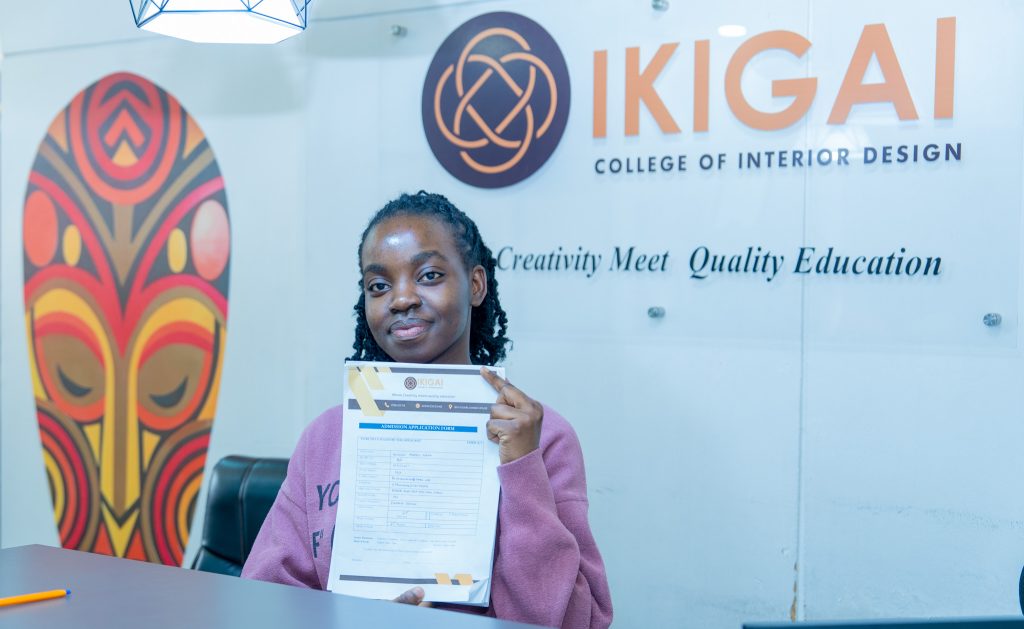Requirements for Studying Fashion Design in Kenya
Introduction
Fashion is more than just clothes—it is art, culture, identity, and business. Across Kenya, the fashion industry has grown rapidly, with designers showcasing their work on global runways and local entrepreneurs building successful brands. As the industry expands, many young creatives are asking: What are the requirements for studying fashion design in Kenya?
This blog answers that question in detail. Whether you’re a high school graduate, a professional seeking a career change, or someone with a lifelong passion for style, this guide will walk you through the academic, personal, and technical requirements for joining a fashion design program in Kenya. We will also highlight TVETA accreditation, career pathways, and why Ikigai College of Interior Design is the leading institution for fashion training.
Why Study Fashion Design in Kenya?
Before looking at requirements, it helps to understand why Kenya is the perfect place to pursue fashion design.
1. Nairobi as a Fashion Hub
Nairobi hosts Kenya Fashion Week, Nairobi Fashion Hub, and countless exhibitions where students can showcase work.
2. Global Meets Local
Kenyan designers blend African textiles such as kitenge, kikoy, and Maasai shukas with modern cuts, making Kenyan fashion unique and globally attractive.
3. Growing Industry Demand
From TV wardrobes to fashion houses and e-commerce, the demand for designers, stylists, and tailors is expanding.
4. Entrepreneurship Opportunities
Kenya’s youthful population loves unique style. Many graduates start brands, boutiques, and online fashion businesses.
5. Affordable, Accredited Training
With TVETA-accredited institutions like Ikigai College of Interior Design, students receive world-class training without leaving the country.
General Requirements for Studying Fashion Design in Kenya
The requirements vary depending on whether you’re applying for a certificate, diploma, or degree program. Let’s break them down:
1. Academic Requirements
Certificate Programs
-
Open to beginners, including those without prior fashion knowledge.
-
Applicants typically need to have completed secondary education (KCSE or equivalent).
-
No specific grades are required at Ikigai College, making it beginner-friendly.
Diploma Programs
-
KCSE completion is usually required.
-
Some institutions may require a minimum grade, but many—including Ikigai—focus more on talent, creativity, and passion rather than grades.
Degree Programs (Universities)
-
Require KCSE with set minimum grades as per university standards.
-
Usually include subject clusters in arts or design.
⚡ Note: Unlike technical courses such as engineering, fashion design prioritizes creativity, interest, and practical ability. Even if you didn’t excel academically, you can still build a successful fashion career.
2. Personal Qualities
Academic papers alone are not enough. To thrive in fashion design, students are expected to bring certain qualities, including:
-
Creativity – ability to generate fresh ideas and styles.
-
Attention to detail – from patterns to finishing touches.
-
Passion for fashion – genuine interest makes learning enjoyable.
-
Adaptability – fashion trends change rapidly.
-
Patience and precision – especially in garment construction.
-
Entrepreneurial mindset – ability to market and sell your work.
Ikigai College recognizes these qualities during interviews and portfolio reviews, ensuring students are placed in the right programs.
3. Portfolio Requirements
Some colleges ask for a portfolio of sketches, artworks, or previous projects. At Ikigai College, beginners are not required to have a professional portfolio—just a willingness to learn. However, advanced applicants may showcase past designs or art projects for placement in higher-level programs.
4. Age Requirements
-
Most programs accept students from 16 years and above.
-
There is no upper age limit—adults can join at any stage of life. Fashion welcomes everyone.
5. Technical and Resource Requirements
To succeed in fashion design programs, students need access to:
-
Basic drawing tools (pencils, sketchbooks, rulers).
-
Sewing materials (thread, needles, scissors).
-
A laptop for digital fashion software (recommended for advanced programs).
-
Fabric samples (often provided by colleges).
Institutions like Ikigai provide well-equipped studios, fashion labs, and machines—so students do not have to purchase everything individually.
Why TVETA Accreditation Matters in Meeting Requirements

When researching requirements, always confirm if the institution is accredited by the Technical and Vocational Education and Training Authority (TVETA).
Why? Because accreditation ensures:
-
Your certificate/diploma is recognized nationally.
-
The training meets industry standards.
-
You are eligible for employment or further study.
-
You are protected from fake colleges offering unrecognized programs.
All major Nairobi fashion colleges—including Ikigai College of Interior Design—are TVETA accredited.
How to Apply for a Fashion Design Course in Kenya
Here’s the step-by-step process most colleges follow:
-
Research institutions (check accreditation and courses).
-
Confirm requirements (academic, personal, and financial).
-
Prepare application documents (KCSE results, ID, passport photo).
-
Submit application online or in person.
-
Attend an interview/assessment (some colleges assess creativity or passion).
-
Receive admission letter.
-
Pay registration and tuition fees.
-
Begin your fashion journey!
Ikigai College has simplified this process—you can apply online for the 2026 intake and receive guidance from admissions staff.
Why Ikigai College of Interior Design Stands Out

If you’re serious about fashion, Ikigai College of Interior Design in Nairobi is your best option. Here’s why:
1. Beginner-Friendly Requirements
No strict grade cut-offs. Anyone with a passion for design can enroll.
2. Comprehensive Curriculum
Courses cover:
-
Fashion illustration
-
Textile design
-
Pattern making
-
Garment construction
-
Fashion marketing and business
-
Digital design tools
3. Practical, Hands-On Training
Ikigai prioritizes studio learning over theory. You create from day one.
4. Career Preparation
Students graduate with strong portfolios, internships, and business skills.
5. Networking Opportunities
With Nairobi’s vibrant fashion scene, Ikigai students regularly showcase in exhibitions and interact with professionals.
6. Flexible Options
Ikigai offers certificate, diploma, and short courses—perfect for different career stages.
7. Supportive Student Culture
Students are encouraged to collaborate, experiment, and innovate in a supportive environment.
Career Paths After Meeting Fashion Design Requirements
Once you’ve met the requirements and completed your course, the possibilities are endless. Graduates can work as:
-
Fashion Designers
-
Stylists
-
Tailors/Dressmakers
-
Textile Designers
-
Fashion Entrepreneurs
-
Costume Designers (film/theatre)
-
Fashion Educators
-
Retail Managers
Many Ikigai alumni have launched successful businesses and showcased at events like Nairobi Fashion Week.
Frequently Asked Questions (FAQs)
1. What grades do I need to study fashion design in Kenya?
Most colleges, including Ikigai, do not require specific grades—just KCSE completion. Talent and passion are more important.
2. Can I study fashion design without KCSE?
Some certificate programs and short courses may allow mature entry. Check with the institution.
3. How long does a fashion design course take?
Certificates: 6–12 months.
Diplomas: 2–3 years.
Short courses: 1–6 months.
4. How much does it cost to study fashion design in Kenya?
Between KES 60,000–200,000 depending on course level and institution.
5. Do I need prior fashion experience?
No. Beginners are welcome. Ikigai teaches from scratch.
6. Can I study fashion part-time?
Yes. Many institutions, including Ikigai, offer flexible schedules.
7. Are fashion design courses recognized internationally?
Yes, as long as the institution is TVETA accredited.
8. Can I work while studying fashion design?
Yes, with part-time or evening programs.
9. What equipment will I need?
Sketchbooks, sewing kits, and access to fabrics. Colleges provide specialized equipment.
10. Can I start a business after graduation?
Yes. Entrepreneurship training equips students to launch their own brands.
Conclusion
Studying fashion design in Kenya is a gateway to creativity, entrepreneurship, and global opportunities. The requirements are accessible to most learners: KCSE completion, a passion for design, and a willingness to learn. With TVETA accreditation ensuring quality and recognition, students can confidently pursue their dreams.
Among all institutions, Ikigai College of Interior Design remains the best choice for 2026. Its flexible requirements, comprehensive curriculum, practical training, and industry connections make it the perfect launchpad for a successful career in fashion.
If you’re ready to turn your creativity into a career, now is the time to apply for the 2026 intake at Ikigai College of Interior Design.
Best Private Colleges for Graphic Design in Kenya
Graphic Design Career in Kenya
Most Preferred Graphic Design School in Kenya
Important Skills to Master for Every Graphic Designer
The Best Interior Design Course in Kenya
Best Interior Design Colleges in Nairobi 2025
Best Interior Design Colleges in Kenya 2025
Graphic Design Course Requirements in Kenya 2025
Best Interior Design Colleges in Nairobi 2025
Best Colleges for Diploma in Interior Design in Kenya
Interior Design Course Requirements in Kenya 2025
Best Colleges for Diploma in Interior Design in Kenya
Top Schools to Study Graphic Design Course in Kenya 2025
Best Colleges Offering Certificate in Interior Design in Kenya
Best College for Graphic Design in Kenya in 2025
Top Schools Offering Interior Design Courses in Kenya 2025
Top Schools Offering Graphic Design Courses in Kenya 2025
Top 5 Interior Design Colleges in Nairobi: Programs and Career Opportunities
The Best Interior Design School in Nairobi- Ikigai College of Interior Design
Top 10 Interior Design Colleges in Kenya 2024
-
short fashion design courses in Nairobi
-
best fashion design short courses in Kenya
-
top fashion design diploma courses in Nairobi
-
fashion design certificate courses in Kenya
-
fashion design short courses in Nairobi
-
best fashion design short courses in Kenya
-
top fashion design diploma courses in Nairobi
-
fashion design certificate courses in Nairobi
-
short fashion design courses in Nairobi CBD
-
best fashion design courses in Kenya
-
best fashion design colleges in Kenya
-
top fashion design schools in Nairobi
-
leading fashion design institutes in Kenya
-
premier fashion design programs in Nairobi
-
best fashion design colleges in Nairobi
-
top fashion design institutes in Kenya
-
leading fashion design schools in Kenya
-
premier fashion design courses in Nairobi


